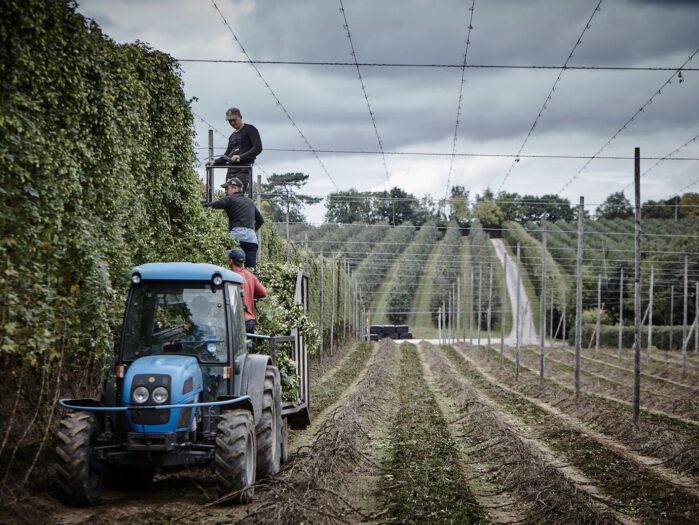
WHAT MAKES
TIRRIL?
Supplier Histories....
Warminster Maltings


Built in 1855 by the Morgan family, Warminster Maltings – still owned privately – is Britain’s oldest working maltings.
All the barley is malted in the traditional way, on floors, using hand operated turners, malt ploughs, and shovels, to control the pace of conversion from barley to malt, almost exactly as it was in 1855. This gives small batches of bespoke high quality malts, full of character that would just not be possible from large scale modern industrial processes.

Mungoswells Malt
Angus McDowell is the fourth generation of his family to farm the fields of Mungoswells Farm, bought in 1921 by his great grandfather Colonel McDowell (inventor of the electric tractor). Angus and his staff plant and grow their own barley across the 550 acre farm which overlooks the Forth Estuary. The Iron Age settlement on the farm is testament to the length of time the land has been under cultivation.
In 2006 their crop of barley was not needed by the national maltsers, so undeterred, Angus an agricultural engineer, simply bought a broken down tower maltings, installed it in the farm and had it working in time to malt his barley crop in 2007. With Angus having lifelong friends in Tirril it was only a matter of time before we were using Mungoswells’ malts in all our beers.
Charles Faram
Hop Factor & Merchant
Nearly as old as Warminster Maltings, Charles Faram has been trading in hops for over 150 years. Originally operating from the Old Hop Market offices on Foregate Street in Worcester (a building which still stands today) Faram joined 30 other Hop Merchants in Worcester to trade hops with the local growers and brewers. He expanded his business to include a traditional hop store in Sansome Street only a few a few blocks away. At the time there were only two UK varieties of hops recognized for their
use in brewing; Fuggles and Goldings. Strangely, the industry at the time did not refer to hops by variety names but instead they were sold under the growers name and the location of the farm. This was probably due to the similarity of the varieties at that time. The hop industry inBritain was at the time a huge industry with 29,000 hectares under
production today there are just under 1,000 as beer production has dropped considerably and more imported hops are used for lagers and other styles of beers. Charles Faram is the only business to have survived in Worcestershire and is now leading they way in development of new hop varieties through its breeding programme in Herefordshire. In the 1980’s the business was sold to hop growers and is now proudly “grower owned”, it sells over 150 hop varieties sourced from across the
globe from temperature-controlled hop storage warehouses in Newland near Malvern.


In the late 90’s Faram’s pioneered the use of nitrogen flushed vacuumsealed “Freshpak” hops in smaller and more manageable quantities -maintaining quality and flavour ensuring whole hops can be used yearround without any deterioration in quality. As traditionalists, thisallows us to carry on using whole hops in our brewing, even though themajority of brewing is now carried out using hop pellets.
Yeast
When we started brewing in Tirril back in 1999, we bought a sample culture of yeast from the BrewLab laboratory in Sunderland. Since then we have skimmed, reclaimed, washed and re-pitched our yeast brew after brew.
Over the hundreds of generations of yeast that have grown in our brews this yeast has become an individual strain, unique to the brewery and to our beer flavours.
We lost nearly all of our yeast in the first Covid lockdown of 2020. Fortunately we have samples permanently stored on ice at BrewLab who were able to culture up more of our yeast to add to our diminished supply and helped to keep our own yeast going in an unbroken chain since we began.


Water
We are incredibly fortunate to be based in the Eden Valley, into where rain water percolates from the Pennines.
The Cliburn bore hole from where our water comes, is a source so pure that North West water used to use the water from Cliburn to calibrate their equipment.
How can we help you?
Copyright © 2025. All Rights Reserved. Website by Freshspace.
Company number 04330761. Registered in England. VAT Registration Number: 789 5452 65. AWRS Number: XQAW00000104305.